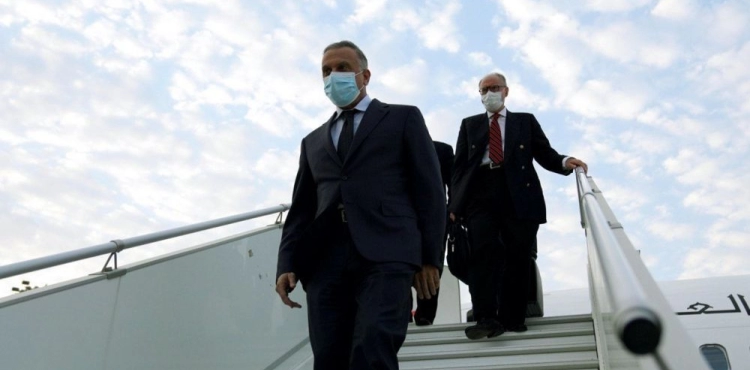Iraqi Prime Minister Mustafa Al-Kazemi arrived in Washington, on Sunday, who is on a visit to the American capital, where he will meet US President Joe Biden, on Monday, and agree with him to withdraw all US combat forces from Iraq, according to Informed sources.
The New York Times quoted US officials as saying that it is likely that a deadline will be announced on Monday for the withdrawal of US combat forces from Iraq, which may be by the end of this year.
According to what the newspaper quoted Pentagon and US administration officials as saying, Washington will respond to the demands to withdraw a small number, still undetermined, out of the 2,500 US troops currently stationed in Iraq, in addition to reclassifying the role of other forces "on paper".
In the words of the newspaper, Al-Kazemi, with this achievement, will achieve a political victory that will bring him back to Iraq to satisfy the anti-US parties in his country, while maintaining the US military presence.
The newspaper described Al-Kazemi’s move as Al-Kazemi’s latest effort to align the needs and demands of Iraq’s two closest allies, the United States and Iran.
The Iranian-backed factions are demanding the withdrawal of US forces from Iraq, while Iraqi officials insist that they still need the support of US forces.
According to sources familiar with the strategic dialogue between Washington and Baghdad, on Friday, it is expected that the levels of US forces in Iraq will remain at their current status, 2,500 soldiers, while the roles of some of them will be redefined.
Experts believe that such a move gives Al-Kazemi a "temporary political cover", redefining the roles of US forces instead of a complete withdrawal, which is likely to be unsatisfactory for the parties calling for the withdrawal of forces.
The New York Times quotes Muhammad al-Rubaie, the political spokesman for the Iranian-backed "Asa´ib Ahl al-Haq" militia, as saying, "Changing their name (the American forces) from combat forces to trainers and advisers (...) we consider it an attempt to deceive."
Asa´ib Ahl al-Haq is one of the largest militias backed by Iran in Iraq, and controls 16 seats in parliament in Baghdad.
On Thursday, an Iraqi delegation began talks in Washington in several areas within the strategic dialogue between the two countries, including what is related to the US military presence in Iraq, prior to Al-Kazemi´s meeting with Biden, Monday, at the White House.
Mara Carlin, the official in charge of international affairs at the US Department of Defense, the Pentagon, received a delegation headed by the Iraqi National Security Adviser, Qassem al-Araji, to discuss "long-term military cooperation" between the two countries, according to Pentagon spokesman John Kirby.
Kirby noted that US Defense Secretary Lloyd Austin joined the talks to "reaffirm his commitment" to continuing the fight against ISIS.
After American interests in Iraq have been targeted since the beginning of the year with about 50 missile or drone attacks, Austin stressed "the need for the United States and the coalition to be able to assist the Iraqi army in complete safety."
Al-Kazemi had discussed with the White House envoy Brett McGurk, last week, in Baghdad, the withdrawal of "combat forces from Iraq."
But White House spokeswoman Jen Psaki said, Thursday, that the Iraqi government "desires the United States and the coalition to continue training and assisting its military, and providing logistical support (and) exchanging information."
And on Friday, Iraq and the United States renewed their commitment to strengthening the partnership between the two countries, and emphasizing its "strength" and based on common interests, with the start of the strategic dialogue meetings between the two countries.
US Secretary of State Anthony Blinken stressed "the strength of the US partnership with Iraq," adding that "the work we are doing with Iraq today is based on achieving common interests."
The Iraqi Foreign Minister, Fouad Hussein, said that "ISIS is still present in Iraq," and that his country renews its commitment to strengthening its strategic partnership with the United States as a key partner in the international coalition to fight the organization, adding, in statements to Al Hurra TV, that the Iraqi security forces "are still They need the programs provided by the United States in terms of training, arming, equipping, and building capabilities.”












